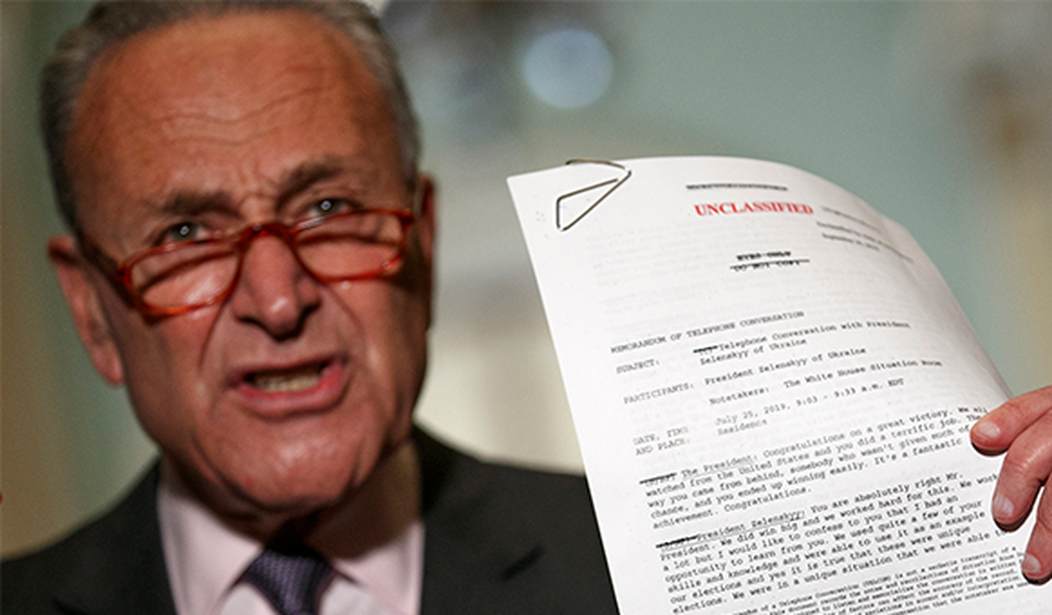Not long ago, House Republicans complained that Democrats imposed excessive secrecy on interviews conducted as part of the drive to impeach President Trump. Now, the situation appears to have gotten worse.
The recent interview of Marie Yovanovitch, the former U.S. ambassador to Ukraine, marked a new point -- a low point, as Republicans see it -- in Democratic efforts to keep impeachment information out of public view.
In this way: The two previous impeachment interviews -- with former ambassador to the European Union Kurt Volker and intelligence community inspector general Michael Atkinson -- were conducted in the format of what is known as a transcribed interview. Rep. Adam Schiff, who is running the Democratic impeachment effort, decreed that transcripts not be released to the public. At the same time, there were no heavily restrictive rules on what would happen should any member of Congress, acting from memory, reveal things that were said in the interview.
The Yovanovitch session was different. Democrats conducted the interview in the format of a deposition, which is different from a transcribed interview. One key difference is that there are serious penalties for lawmakers who reveal the contents of a deposition. Doing so would almost surely subject the offending member to a House ethics investigation.
All Republicans remember the price paid by Rep. Devin Nunes, who, in 2017, as chairman of the Intelligence Committee, faced an ethics investigation based on a complaint from a Democratic-allied outside group alleging he leaked classified information. Nunes was later cleared of all the charges, but he had to distance himself from some committee activities as the probe slowly proceeded.
Recommended
Now, some Republican lawmakers express fear of Democrats siccing an ethics investigation on them if they reveal what took place in the Yovanovitch interview, even though none of what was discussed was classified. Look at what happened to Devin, they say.
So Republicans feel tight restrictions on what they can say. What was Yovanovitch asked? What did she answer? Were her answers consistent with what is known about the case? Republicans can't say, fearful that Schiff and the Democrats will come after them.
Here is the clever part, from the Democratic perspective. As the Yovanovitch interview began, her 10-page opening statement quickly leaked. In it, Yovanovitch made her case for all the press to read. Headline after headline appeared, all based on the statement:
-- Washington Post: "Ousted ambassador Marie Yovanovitch tells Congress Trump pressured State Dept. to remove her."
-- Politico: "Marie Yovanovitch says Trump ousted her over 'unfounded and false claims.'"
-- CNN: "Former U.S. ambassador to Ukraine says Trump wanted her removed and blames 'unfounded and false claims.'"
-- New York Times: "Ukraine Envoy Says She Was Told Trump Wanted Her Out Over Lack of Trust."
-- Wall Street Journal: "Trump Pressed for Ukraine Envoy's Removal, She Tells Lawmakers."
Democrats and Yovanovitch got their side of the story out without any rebuttal from Republicans. Beyond the leaked written statement, what did she actually say in the deposition? Did Republicans question her about her claims? Did the questioning reveal any facts not included in Yovanovitch's opening statement? Were there any contradictions?
None of that was known. Yovanovitch's opening statement instantly became the accepted version of the story. Meanwhile, Republicans said nothing.
Take, for example, Rep. Scott Perry, one of the four GOP House members in the room. Appearing on Fox News, Perry was asked what was said at the deposition. "Unfortunately, in the ever-changing rules situation here, I can't tell you what happened in that room," Perry answered.
In private conversation, other sources were equally reticent. All were silenced by the Democrats' strategic use of House procedures.
"Depositions are governed by very specific House regulations," said a House staffer in a text exchange. "Only one lawyer can ask questions per round, agency counsel is barred from attending, and the testimony is close hold. Transcribed interviews, in comparison, really don't have any hard rules." The only exception, the staffer said, is a closed session of the Intelligence Committee, which is not what the Yovanovitch deposition was.
Finally, the contents of the interview are being kept secret, not only from the public, but from other lawmakers. Perhaps a dozen members have heard any of the testimony in the impeachment hearings so far. The other 420 or so don't know what went on.
In his much-criticized letter to Congress, White House counsel Pat Cipollone said Democratic handling of the impeachment investigation "violates fundamental fairness." He meant fairness toward the target of the proceeding, President Trump. But there is also the question of fairness toward the American people trying to follow an impeachment process shrouded in secrecy. Don't they have the right to know what the president's accusers say?
(Byron York is chief political correspondent for The Washington Examiner.)

























Join the conversation as a VIP Member